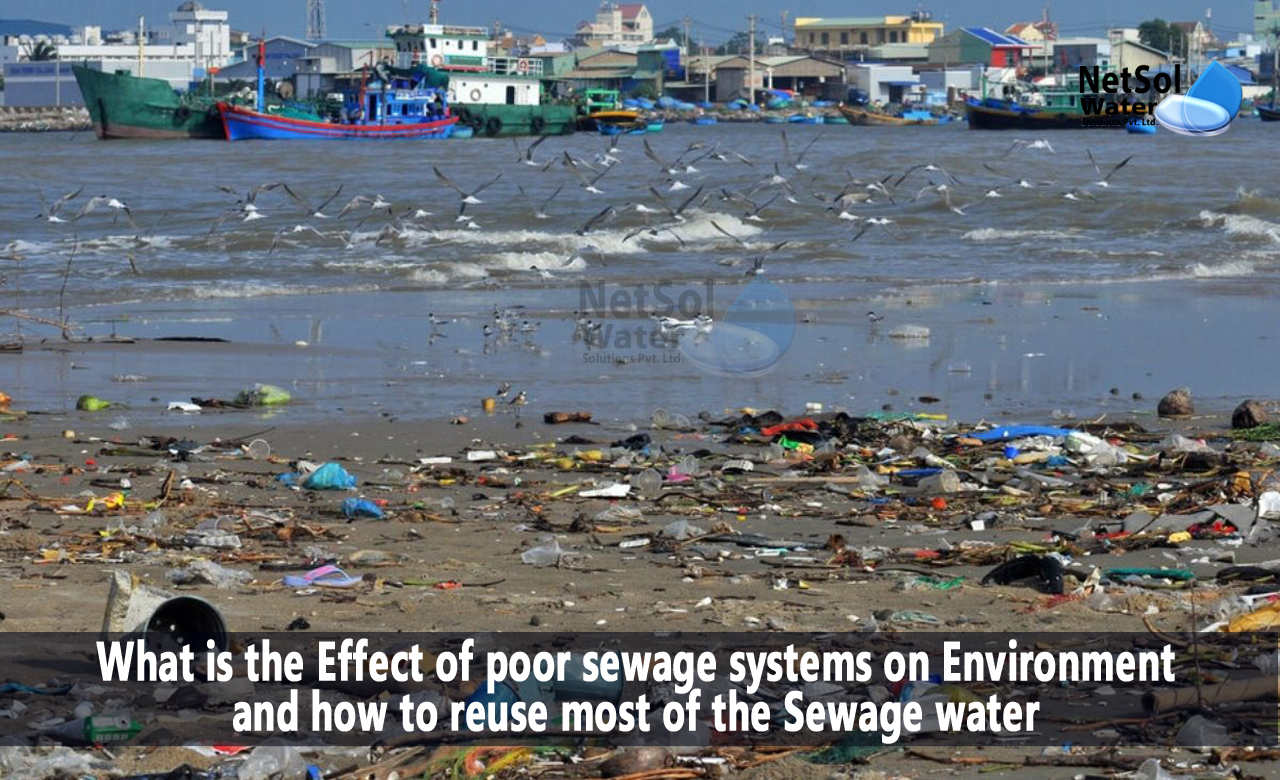What is the Effect of poor sewage system on Environment?
Sewage systems, when poorly managed, can have significant adverse effects on the environment. In this blog, we will explore the environmental consequences of poor sewage systems and discuss innovative ways to reuse sewage water to mitigate these impacts.
The Environmental Impact of Poor Sewage Systems
1. Water Pollution
One of the most immediate and noticeable effects of poor sewage systems is water pollution. When untreated or inadequately treated sewage is discharged into water bodies such as rivers, lakes, or coastal areas, it introduces a cocktail of contaminants. These contaminants include:
· Pathogens: Disease-causing microorganisms like bacteria, viruses, and parasites can contaminate water bodies, posing risks to aquatic life and humans who use these waters for drinking or recreation.
· Nutrients: Sewage containshigh levels of nutrients like nitrogen and phosphorus. Excessive nutrient discharges lead to eutrophication, where nutrient-rich water promotes the rapid growth of algae. This, in turn, depletes oxygen levels in the water, causing harm to aquatic ecosystems.
· Chemical Pollutants: Sewage can contain a wide range of chemicals, including pharmaceuticals, personal care products, and industrial contaminants. These chemicals can harm aquatic life and persist in the environment.
2. Habitat Degradation
Sewage pollution can severely damage aquatic habitats. Eutrophication and the growth of harmful algal blooms can disrupt the balance of ecosystems. As oxygen levels decline, it leads to "dead zones" where aquatic life cannot survive. This can have cascading effects on fisheries, aquatic plants, and the overall health of water bodies.
3. Harm to Wildlife
Aquatic wildlife, including fish, amphibians, and invertebrates, can be severely impacted by sewage pollution. Contaminants in sewage can disrupt reproductive cycles, impair immune systems, and lead to population declines. In some cases, toxins produced by harmful algal blooms can directly harm or kill aquatic organisms.
4. Groundwater Contamination
Improper sewage disposal, such as septic tank leakage or the discharge of untreated sewage into open areas, can contaminate groundwater. This poses risks to human health as well as the environment. Groundwater contamination can lead to the spread of pollutants over vast areas, affecting both surface water and underground aquifers.
5. Beach Closures
Sewage pollution often results in the closure of beaches and recreational areas. This not only restricts human enjoyment of natural spaces but also harms local economies that rely on tourism.
6. Air Pollution
Poorly managed sewage treatment facilities can emit foul-smelling gases, such as hydrogen sulfide and methane, into the atmosphere. These gases not only contribute to air pollution but can also irritate the respiratory system and lead to health issues among nearby communities.
Sustainable Solutions for Sewage Water Reuse
To mitigate the environmental impacts of sewage pollution and promote sustainable water management, sewage water can be treated and reused effectively. Here are some innovative approaches to sewage water reuse:
1. Tertiary Treatment and Advanced Technologies
Implementing advanced treatment technologies, such as membrane filtration, ultraviolet disinfection, and ozone treatment, can improve the quality of treated sewage effluent. These methods can remove a higher percentage of contaminants, making the water suitable for various non-potable purposes.
2. On-Site Water Treatment
Encouraging on-site water treatment systems for homes and businesses can reduce the load on centralized treatment plants and allow for localized water recycling. These systems can treat sewage water to a quality suitable for irrigation, toilet flushing, and industrial processes.
3. Dual Water Distribution Systems
In some areas, dual water distribution systems are being implemented. One system delivers potable water for drinking and other human uses, while a separate system provides treated sewage water for non-potable purposes like landscape irrigation and industrial cooling. This approach conserves freshwater resources and reduces the discharge of treated effluent into the environment.
4. Constructed Wetlands
Constructed wetlands mimic natural processes to treat sewage water. They are effective at removing nutrients, organic matter, and pathogens. These systems provide habitat for wildlife and can be integrated into urban landscapes as green infrastructure.
5. Reuse in Agriculture
Treated sewage water can be reused in agriculture, particularly for irrigation. However, it is crucial to ensure that the quality of the treated water meets agricultural standards and does not harm crops or contaminate soil.
6. Direct Potable Reuse (DPR)
In some regions, advanced treatment processes can produce water of sufficient quality to be directly added to the drinking water supply. Direct potable reuse involves rigorous monitoring and quality control to ensure the safety of the water.
7. Industrial Use
Treated sewage water can be an excellent resource for industries that require significant amounts of water for cooling or processing. Using treated sewage water in industrial processes reduces the demand for freshwater and minimizes environmental impact.
8. Education and Public Engagement
Promoting awareness and educating the public about the safety and benefits of sewage water reuse is essential. Public acceptance and support are key to the success of water recycling initiatives.
Conclusion
The environmental impacts of poor sewage systems are significant and far-reaching, affecting water bodies, ecosystems, and human health. However, by adopting sustainable solutions for sewage water reuse, we can mitigate these impacts and ensure the responsible management of this valuable resource.
Efforts to improve sewage treatment and promote water reuse not only protect the environment but also help conserve freshwater resources and enhance the resilience of communities in the face of water scarcity and climate change. Sewage water, when treated and managed effectively, can be a valuable asset rather than a liability, contributing to a more sustainable and water-secure future for all.
Netsol Water is Greater Noida-based leading water & wastewater treatment plant manufacturer. We are industry's most demanding company based on client review and work quality. We are known as best commercial RO plant manufacturers, industrial RO plant manufacturer, sewage treatment plant manufacturer, Water Softener Plant Manufacturers and effluent treatment plant manufacturers. Apart from this 24x7 customer support is our USP. Call on +91-9650608473, or write us at enquiry@netsolwater.com for any support, inquiry or product-purchase related query.



